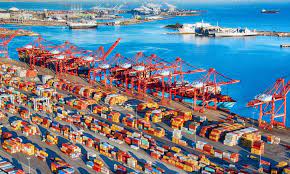The Port of Long Beach announced it will receive a $30.1 million grant from the U.S. Department of Transportation to deploy the U.S. largest fleet of manually operated, zero-emissions cargo handling equipment at a single marine terminal.
Funding for the new clean air project comes from the 2022 Port Infrastructure Development Program, administered by the U.S. Maritime Administration.
The project will replace diesel yard tractors at Long Beach Container Terminal with approximately 60 electric, human-operated yard tractors.

The project at LBCT – which can move 3.3 million cargo container units annually, more than most U.S. ports – also includes construction of electric equipment charging stations with energy efficiency-enhancing software, training for operators and maintenance personnel, and installation of software equipment to streamline cargo-handling operations within the terminal.
The Port of Long Beach has set a goal of all zero-emissions cargo-handling equipment by 2030 and a zero-emissions drayage truck fleet by 2035. About 17% of the cargo-handling equipment at the Port is electric powered, the largest such fleet in the United States.
As a signal of that progress, in September, the Port announced that a trucking company partner will convert to fully-zero emissions by 2025 – 10 years before the 2035 goal.
Compared to 2005, the year before the Clean Air Action Plan was adopted, the Port of Long Beach has reduced emissions of diesel particulate matter by 88%, nitrogen oxides by 49%, and sulfur oxides by 96%.
Since 2021, the Port has put in place a number of initiatives to further reduce air pollution and build a technological and operational bridge to a zero-emissions future. These include:
Managing $150 million in zero- and near zero-emissions demonstration projects inside the Port and on Southern California roads. To date, $70 million in grant funding has been secured for these projects.
Adopting an updated Green Ship Incentive Program that provides the largest incentive for Tier III vessels, which are the cleanest vessels available today. Last August, the Port of Long Beach became the first seaport on the West Coast to refuel an LNG-powered ship, the cleanest commercially available cargo ship.














